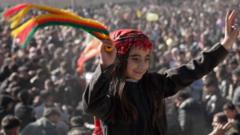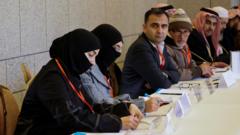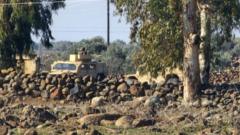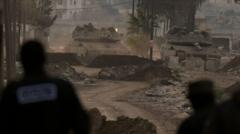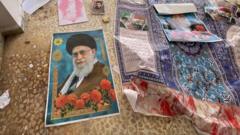In Damascus, excitement collided with skepticism as Ahmed al-Shara’s rise to the presidency following the overthrow of Bashar al-Assad highlighted diverse reactions among the populace.
Syria's New Leadership Sparks Mixed Reactions Amid Transition

Syria's New Leadership Sparks Mixed Reactions Amid Transition
The declaration of Ahmed al-Shara as President raises questions about the future and inclusivity of Syria's governance.
In the heart of the Syrian capital Damascus, enthusiasm surged on Wednesday after rebel leader Ahmed al-Shara was announced as the interim president to lead the nation through a transitional period. This shift of power came nearly two months after his coalition effectively deposed the long-time dictator Bashar al-Assad. Yet, the expected public speech from al-Shara never materialized.
Instead, key state decisions trickled out via the national news agency: the council led by al-Shara nullified the existing Constitution, dissolved the legislature, and disbanded the army that served under Assad's regime. While there were celebrations in the streets, many voiced concerns about the suddenness and top-down nature of these decisions.
Dr. Salam Said, a Syrian researcher, pointed out the centralization of power in al-Shara’s hands and highlighted the fears among progressive elements in society about their exclusion from a new governance structure. “They say temporary president, transitional period. But how long is this period?” she questioned.
As for the diverse groups within Syria, questions loom over whether al-Shara's leadership can genuinely represent all factions and deliver on promises of inclusivity and democratic governance in a nation with a fraught political past.
Instead, key state decisions trickled out via the national news agency: the council led by al-Shara nullified the existing Constitution, dissolved the legislature, and disbanded the army that served under Assad's regime. While there were celebrations in the streets, many voiced concerns about the suddenness and top-down nature of these decisions.
Dr. Salam Said, a Syrian researcher, pointed out the centralization of power in al-Shara’s hands and highlighted the fears among progressive elements in society about their exclusion from a new governance structure. “They say temporary president, transitional period. But how long is this period?” she questioned.
As for the diverse groups within Syria, questions loom over whether al-Shara's leadership can genuinely represent all factions and deliver on promises of inclusivity and democratic governance in a nation with a fraught political past.









